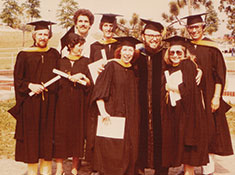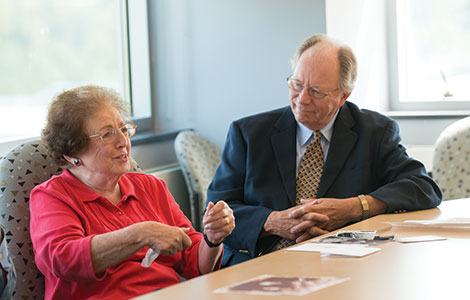Ernie Kent ’77, M.P.P. public policy, recently returned to campus to talk about her time as one the first group of 12 students enrolled in UMBC’s public policy master’s program – a group dubbed “the Dirty Dozen.”
Many of those students – including Kent and other members of the program’s first graduating class of seven students in 1977 – went on to have distinguished careers in public service in Maryland and elsewhere.
Indeed, Kent was among the most knowledgeable and effective figures in Maryland politics from the 1960s through her retirement from state government in 2000. Her career was spent mostly behind the scenes, starting as a researcher for the Maryland Constitutional Convention in 1967–1968. Her achievements and her passion for making state government function better won her key positions under a number of Maryland administrations – starting with Governor Marvin Mandel in 1968 – and in the private sector.
In December 2000, Baltimore Sun political columnist Barry Rascovar lauded Kent’s roles in streamlining of Maryland’s governmental structure under Governor Mandel and in a number of state redistricting efforts, calling her “one of those silent heroes with an institutional memory and a grasp of government detail who makes government work.”
Kent also played a role in the founding of UMBC’s highly-regarded Public Policy program – which became the UMBC School of Public Policy in 2015. “We were asked to be part of the program,” recalls Kent, who was impressed by the wide range of governmental experience and discipline represented in the first group of graduates.
A picture of the program’s first seven graduates that Kent provided to UMBC Magazine illustrates that perfectly. Along with Kent, who was still a member of Governor Mandel’s staff at that time, one sees her husband, Jack Kent ’77, M.P.P. public policy, who was then an assistant secretary in Maryland’s Department of Health and Mental Hygiene, and became a delegate in the Maryland House of Delegates and a senior executive at Sheppard Pratt Hospital. There is another future member of the Maryland House, Larry LaMotte ’71, sociology, and ’77, M.P.P. public policy, in the photo, along with Lauretta De Busk ’72, psychology, and ’77, M.P.P. public policy, who worked as a planner at Maryland’s Department of Health and Mental Hygiene and later joined the U.S. State Department. The late Ben Kleinberg, a professor of sociology who was one of the initiators of the program, is there as well, along with the late Sonia Sheinbach ’72, political science, and ’77, M.P.P. public policy, who worked for the Baltimore Social Services Administration, and her husband, Jerry Sheinbach ’77, M.P.P. public policy, who ran the Medicare Program at Social Security in Baltimore.
Kent says she “learned from the interchange of ideas with other members of the class and the teachers.” The program’s professors were drawn from disciplines including sociology, history, economics, psychology, and political science, and students even had the chance to use some of the university’s early mainframe computers. “I also acquired some computer skills,” Kent recalls, though she also remembers that results could vary “depending on which way you put the cards in.”
UMBC’s graduate programs in public policy have come a long way since that first class. The program admitted its first class of Ph.D. students in 1978 – and its doctoral program has become one of the largest in the nation, celebrating its 40th anniversary in November 2014.
“I am amazed how much the program has grown,” Kent says, “and how many tracks were now available to the students, as well as many more course offerings.”
— Richard Byrne ’86
Tags: Winter 2016



